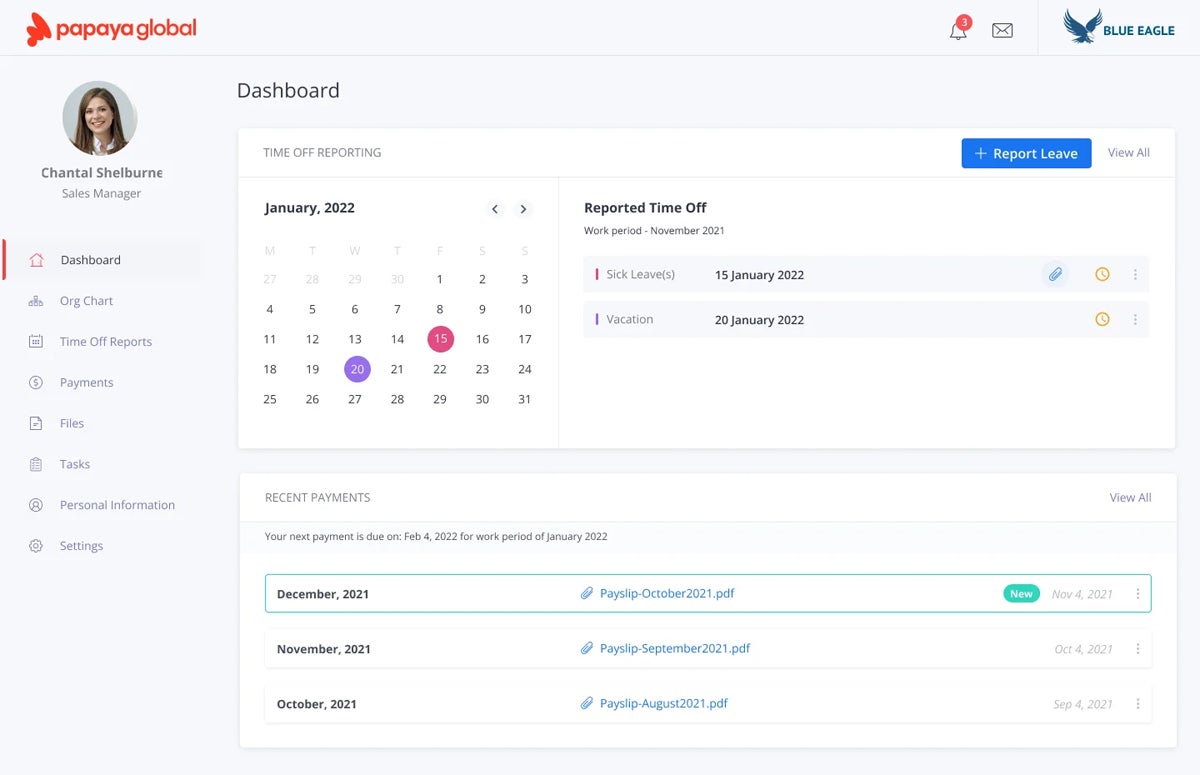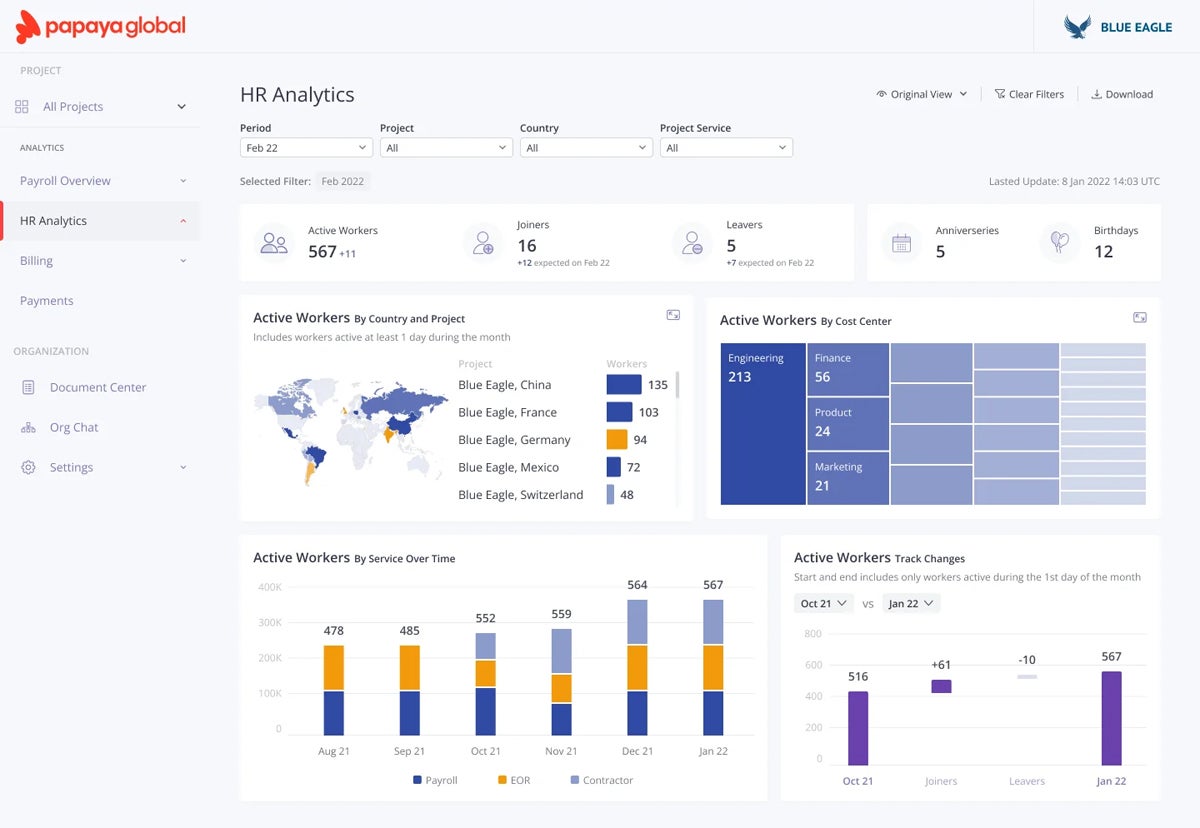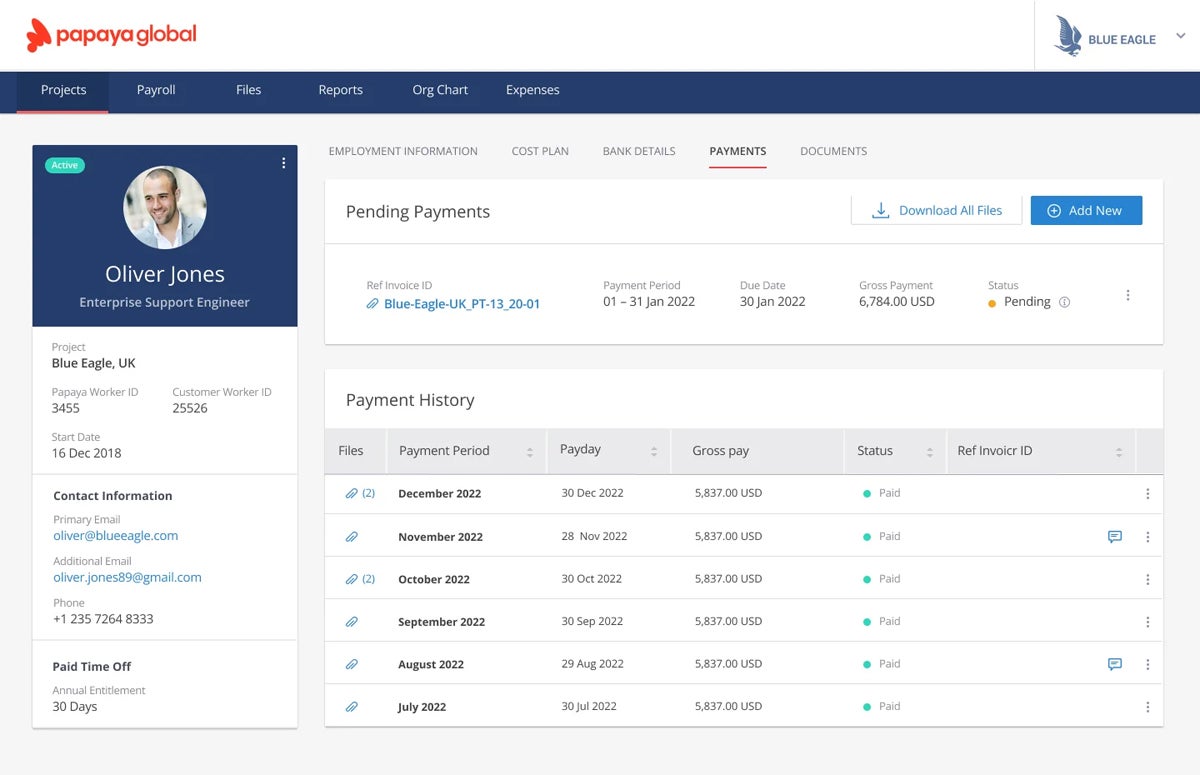
Papaya Global is an international professional employer organization that helps U.S.-based businesses hire employees in more than 160 countries. Its comprehensive, cloud-based system streamlines payroll processing, employee benefits administration and general workforce management for global employers.
In our Papaya Global review, we cover the international payroll service’s top features, plans and starting prices. We also review its pros, cons and top global payroll alternatives to help you decide if Papaya is the best international payroll solution for you.
Papaya Global pricing and plans
| Payroll Plus | Contractor Payments & Management | Employer of Record | |
|---|---|---|---|
| Starting price | $25/employee/mo. | $30/contractor/mo. | $599/employee/mo. |
| Minimum user requirement | 101 employees | No listed minimum | No listed minimum |
| Availability | 160+ countries | 160+ countries | 160+ countries |
| Built-in time and attendance | Yes | No | No |
| Customer support | Dedicated account manager | None listed | Dedicated account manager |
Plan and pricing information up to date as of 2/27/2024.
From its PEO payroll software to its employer of record solution, Papaya Global offers a variety of global employment models to help customers find dedicated solutions uniquely customized to their hiring needs.
Payroll Plus
Payroll Plus is Papaya’s principal international payroll tool. Using Papaya’s unified software platform, businesses can pay employees in 160+ countries in their local currencies.
Payroll Plus breaks down into three plans and price points based on business size:
- Grow Global: Starts at $25 per employee per month. Intended for businesses with 101 to 500 employees and up to four entities.
- Scale Global: Starts at $20 per employee per month. Intended for businesses with 501 to 1,000 employees and up to 10 entities.
- Enterprise Global: Starts at $15 per employee per month. Intended for businesses with over 1,000 employees and more than 10 entities.
Of course, since each plan requires a minimum number of users, it could be more useful to calculate monthly starting prices rather than looking at per-employee fees. Here’s how much you’ll pay for Papaya’s Payroll Plus plans based on minimum employee numbers:
- Grow Global will start at $2,525 per month for companies with 101 employees.
- Scale Global will start at $10,020 per month for companies with 501 employees.
- Enterprise Global will start at $15,015 per month for companies with 1,001 employees.
On top of the user fees listed above, Papaya Global charges the following additional fees:
- Payment transactions with fees starting at $2 per transaction.
- An unspecified setup/implementation fee.
No matter which Payroll Plus plan your business falls under, you’ll have access to the same suite of features. Most notably, each plan includes automatic local currency payments (deposited directly into workers’ accounts), automatic local payments, reporting and analytics tools, time and attendance tracking, 24/7 chat-based support and Papaya’s global knowledge base.
Contractor Payments & Management
If you work solely with global contractors, not global employees, Papaya’s contractor payroll plan starts at $30 per contractor per month.
The plan includes country-specific, legally compliant contract generation, in-platform contract signatures, support for hourly and flat-fee contractors, custom user permissions and bulk onboarding for up to 1,000 contractors.
Global Workforce Payments
Papaya Global’s workforce payments system lets you pay employees, contractors and local authorities in local currencies starting at $2.50 per transaction.
Employer of Record (EOR)
Like its top competitors, Papaya offers an employer of record service that allows businesses to operate in countries where they lack an established entity. Papaya’s EOR solution starts at $599 per employee per month and is available in 160+ countries.
Agent of Record
Starting at $200 per contractor per month, Papaya’s Agent of Record service can take over global contractor management on your behalf. The service includes local compliance, accurate contractor classification and full liability coverage.
Papaya Global’s key features
Global payroll
Papaya Global’s payroll features helps organizations administer locally compliant payments in over 160+ countries. Businesses can quickly process invoice payments and perform payroll operations for contractors and employees alike. Finally, businesses can gain comprehensive insights from their global payroll data and conduct intelligent financial forecasting.
Papaya’s global payroll system works just as well for employees as for employers. Its user-friendly payroll features for employees include easy self-service access to payroll data, paid time off and pay stubs.

Embedded payments in local currencies
Using Papaya, you can pay employees, contractors and local authorities (for instance, tax bureaus) from within the software itself. Plus, payments happen near-instantaneously: 95% of all Papaya payments are processed on the same day.
HR and payroll analytics
Papaya Global’s reporting and analytics tools make it easy for businesses to track their payroll, payment and HR data so they can quickly reach actionable insights. The solution provides people reports on key datasets like payroll costs and HR workforce analytics so organizations can track patterns, identify trends and implement concrete solutions. Plus, payroll reports include data monitoring so organizations can identify important data trends in real-time.

Employee self-service portal
Papaya Personal is Papaya’s self-service platform for employees, workers and contractors. The portal is available in multiple languages and accessible both on desktop and mobile.
Through their Papaya Personal accounts, workers can create profiles, manage their time-off reports, and view and access their payslips, payroll statements and other employment documents. In addition, Papaya Global’s employee self-service solution lets workers set up automated alerts to keep them on track. Contractors can also submit and review payment requests and submit tax invoices easily within one central system.

Third-party integrations
Papaya Global’s system supports some third-party integrations that help streamline data syncing and improve accuracy and security. Specifically, Papaya Global supports integration connections with various commonly used business software solutions like Netsuite, Oracle and SAP SuccessFactors.
Papaya’s pros
- Convenient, fast and secure embedded payment system.
- Affordable, scalable payroll platform.
- Available in 160+ countries (more than nearly any other international payroll service).
- Multiple workforce payroll solutions, including EOR, agent of record and payroll software.
- Dedicated account managers with Payroll Plus and EOR services.
- Robust analytics and reports, including predictive analytics, people reports, financial forecasting and comprehensive company insights.
- User-friendly employee self-service tool.
Papaya’s cons
- 24/7 customer service is chat-based only.
- EOR aggregator model may be too clunky and complicated for some businesses.
- PEO system can be similarly complicated compared to more streamlined EOR competitors.
- Limited HR features, especially compared to other global payroll and HR solutions.
- May be too expensive for some businesses, especially in terms of less transparent management and setup fees.
Alternatives to Papaya Global
If Papaya Global isn’t the right international payroll software fit for you, one of these top Papaya competitors might work better.
| Provider | Rippling | Deel | Multiplier | Papaya Global |
|---|---|---|---|---|
| Our star rating | 4.3 out of 5 | 4.7 out of 5 | 4.1 out of 5 | 4.2 out of 5 |
| EOR starting price | Custom | $599/employee/mo. | $400/employee/mo. | $599/employee/mo. |
| Payroll starting price | Custom | Custom | Custom | $25/employee/mo. |
| Contractor starting price | Custom | $49/contractor/mo. | $40/contractor/mo. | $30/contractor/mo. |
| Availability | Unlisted | 100+ countries | 150+ countries | 160+ countries |
| Learn more | Visit Rippling | Visit Deel | Visit Multiplier | Visit Papaya Global |

Rippling
Our star rating: 4.3 out of 5
Rippling’s global payroll management technology provider allows organizations to source talent internationally and manage dispersed teams. As a modular software solution, Rippling lets global business owners build their own truly unique solutions with modules for finance, HR, payroll, tech and more. Rippling is also one of the most fully automated solutions on the market, enabling businesses to keep its most crucial functions in house and residing within the same system.
However, while Rippling’s EOR solution has comprehensive features and automations, it isn’t available in as many countries as most of its competitors. The company does have plans to expand, so if your preferred country for hiring and onboarding isn’t yet serviced by Rippling, chances are it will be soon.

Deel
Our star rating: 4.7 out of 5
DeelHR (or simply Deel) excels at both global payroll software and workforce management via an excellent set of HR tools that are free for businesses with up to 200 workers. If you use Deel for both HR and payroll, it’s easy to hire, onboard and pay employees without switching between systems. Deel also offers country-specific benefits packages to ensure you can attract and retain top talent anywhere in the world.
Read our Deel vs. Papaya Global comparison piece to learn more about how the two payroll competitors stack up.

Multiplier
Our star rating: 4.1 out of 5
Multiplier’s EOR supports businesses with international workers in 150+ countries, which makes it the most widely available global payroll solution after Papaya. In addition to global payroll processing, Multiplier’s secure solution minimizes the headaches — and compliance risks — inherent to international onboarding. The software offers features for maintaining compliance throughout the entire employment lifecycle.
Our review methodology
To review Papaya Global and its competitors, I viewed comprehensive demos of each payroll software choice. I tested the software myself whenever possible and met directly with company representatives to ask specific questions and see the software in action.
To calculate star ratings, I relied on my firsthand experience, extensive research into each provider’s product and verified user reviews to evaluate each payroll product according to the following key metrics:
- Pricing, which included assessing companies’ highest and lowest pricing tiers, level of pricing transparency and add-on fees, if any.
- Features, which included assessing how comprehensive each payroll product was in terms of global payroll specifically and domestic payroll generally.
- Ease of use, which included evaluating each product’s automations, customizations, third-party integrations, user interfaces and mobile apps, among other criteria.
- Customer service, which included evaluating modes of contact, dedicated customer account managers (or the lack thereof), customer service reviews, company reputation among current and former customers, online knowledge bases, response times and more.
Read TechRepublic’s payroll software review methodology to learn more about the in-house algorithm we use to calculate star ratings.
Frequently asked questions
What does Papaya Global do?
Papaya Global is an international payroll service that helps employers hire and pay employees and contractors in over 160 countries. Papaya offers a range of products, including an employer of record service for businesses that lack entities in foreign countries and a global PEO service for companies with foreign entities.
How much does Papaya Global cost?
Papaya Global’s global payroll starting price is $25 per employee for businesses with between 101 and 500 employees. The price per person decreases the bigger your company gets: Payroll costs $20 per employee for businesses with 501 to 1,000 workers and $15 per employee for businesses with 1,000+ workers.
Papaya also offers a global contractor payroll service for $30 per contractor per month. Its EOR service starts at $599 per employee per month.
Are Papaya’s payments secure?
Yes, Papaya’s payments are secure. The system is GDPR and SOC compliant. All data and communication are encrypted. The application itself is hosted by Amazon Web Services.
Is Papaya Global good?
Yes, Papaya Global is generally considered a good payroll system for paying global employees. Its AI-powered global payroll system helps you tackle payroll tasks as quickly and efficiently as possible while its embedded payment function minimizes the steps you have to take to get your global workforce paid.
However, whether or not Papaya Global is good for your company depends on factors like what features you need in a payroll processing system, what price points you can afford and where you hope to hire internationally. Scheduling a demo with Papaya and reading reviews of the best international payroll software can help you evaluate Papaya Global for yourself.




